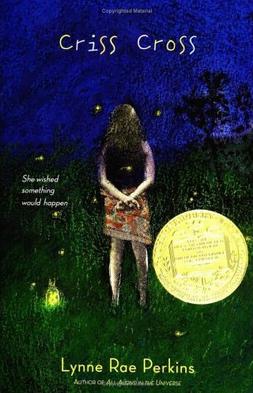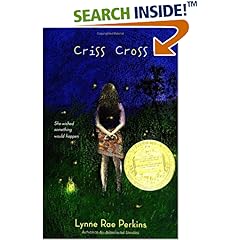 It took me a while to get into Criss Cross, by Lynne Rae Perkins. There are multiple points of view (which I just complained about in The View from Saturday), and the whole tone of the narrative is rather off-hand and breezy. It didn't pull me into its criss-crossing stories right away. It was easy to put it down, which I don't think is particularly advantageous for a book. Too many readers might never come back.
It took me a while to get into Criss Cross, by Lynne Rae Perkins. There are multiple points of view (which I just complained about in The View from Saturday), and the whole tone of the narrative is rather off-hand and breezy. It didn't pull me into its criss-crossing stories right away. It was easy to put it down, which I don't think is particularly advantageous for a book. Too many readers might never come back.I'm glad I kept coming back to Criss Cross, though. Over and over again, Perkins reminded me of what it was like to be 13 or 14. What it was like to wonder obsessively about your adult life-to-be, to stare at yourself in the mirror, and to question your identity and your relationships. Relationships with people you'd just met, changing interactions with people you'd known for years, pondering how minor decisions with these people could change your whole life. Perkins also shows how a teacher's encouragement leads one student towards a vocation and certain corresponding social roles, how seeing a guy playing a guitar at a coffee shop shop sends another kid in a different direction, and how something as random as a locker's location sparks an attraction to a neighboring classmate. It's all presented in a rather timeless manner, though I soon figured out that Criss Cross was set in the 1970's.
There are no overt references to Watergate or Viet Nam or to pop culture (no M*A*S*H* or Charlie's Angels or Led Zepplin or Everything You Always Wanted to Know About Sex*). A couple of the female characters fret about the perfect bell-bottomed jeans. Perkins' drawings of the jeans (including a thought bubble of what you say to your mom in the dressing room) is one of my favorite illustrations, one of the many illuminating cartoons that add something special to the narrative. It reminded me (favorably) of both Sherman Alexie's The Absolutely True Diary of a Part-Time Indian and Jeff Kinney's Diary of a Wimpy Kid. And it should be noted that this is something that audiobook readers just won't get, which is a shame.
Criss Cross captures a bit of everyday life in small town: block parties, summer evenings spent listening to the radio in a truck in the driveway, and chance encounters at the Tastee-Freez - all things that I don't think are that different today than they were 30 years ago. I liked this, and I liked how Perkins handled the historicity of the story in such a subtle way.
One thing that did strike me as inescapably dated: near the end of Criss Cross, Debbie gets a letter from a boy she met (which is actually how my relationship with my husband started after a chance encounter twenty-six years ago). Obviously, this was back before e-mail, cellphones, or texting:
Debbie heard footsteps, and she quickly stuffed the picture of Peter down between her bed and the wall. The curtain moved, and her mother's head appeared.
"You have a letter," she said. "From California." (p. 279)
...Helen did sense something, an undercurrent. She thought that Debbie probably had a crush on this boy. But California was pretty far away, and she couldn't have gotten to know him very well in such a short time. Maybe they would exchange a few letters.
"He looks very nice," she said. "He's a cute boy."
"He is nice," said Debbie.
It was as close as she could come to saying, "I need to go to California. Can I?"
But it wasn't very close, not close enough. Her mother had no way of knowing that this would have been a good time to tell her daughter that she had once known a boy who went away. A boy who had made a game of finding little figures of dogs, and giving them to her. They might have talked then about how that felt, and what you did next. But their secrets inadvertently sidestepped each other, unaware, like blindfolded elephants crossing the tiny room (p. 281).
Readers looking for an exciting action-filled story with definite conclusions will probably be disappointed by Criss Cross, but I found myself wanting to know more about the characters after I finished it (see Peter D. Sieruta's blog post on "You Know It's a Good Book When...."). What happens to Lenny? He was one of the most appealing characters I've run across in a kids' book lately. Does Dan Persik redeem himself or turn into even more of ass? Does Hector keep playing the guitar? Does Debbie write back to Peter? Maybe she can go to college in California.
Yes, I guess I did like Criss Cross quite a bit.
*But Were Afraid to Ask - a book I remember sneaking quite a few looks at in my early teens in the 70's. Sex is not really an issue broached in Criss Cross, though romantic attraction is important in it. This makes the book more accessible to younger readers, though they might be bored with adolescents' ruminations about life.

 I decided to try listening to an audiobook while knitting, and I chose
I decided to try listening to an audiobook while knitting, and I chose 



